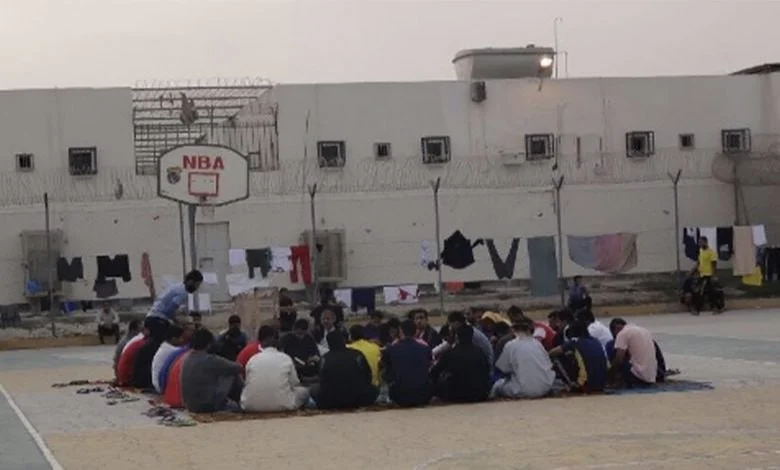“When I look at the full picture, I can only conclude that it is a kind of a slow death. They are trying to end our lives by not providing treatment and healthcare. Especially with the cases that are much worse than mine. It seems this decision has been made at the highest levels,” Al-Khawaja stated, encapsulating the deplorable condition of Bahrain’s prison system.
This practice, which is frequently referred to as the “slow death policy,” subjects political detainees incarcerated in Jau Prison to harrowing suffering. Detained individuals languish in critical need of medical attention due to improper healthcare provisions, retaliatory actions, and mistreatment.
Jau prison, notorious for housing political prisoners, has been the site of mistreatment and cruelty inflicted upon human rights activists. Since the violent repression of the pro-democracy movement in 2011, the government has increased its restrictions on civil liberties, resulting in an environment where dissenting opinions are reviled and feared. Countless political prisoners enduring the torment of being denied proper medical care while facing retaliatory measures. More specifically, approximately 1,500 political detainees are confined into a space serviced by a mere two or three medical staff. Such conditions starkly amplify the gravity of the situation, leaving detainees vulnerable and devoid of essential healthcare services.
Abdulhadi Al-Khawaja, a prominent human rights defender, is a glaring example of the brutal reality within Bahrain’s prison system. Denied access to crucial medical care, including appointments with a cardiologist, he lives on the brink of a heart attack or stroke. Despite numerous requests, the system consistently refuses to provide critical medical care, thereby exacerbating the imminent danger to his life and exemplifying the profound repercussions of systemic dereliction.
Dr. Abduljalil Al-Singace‘s unrelenting hunger strike spanning a year and a half is a testament to his defiance against the deplorable conditions inside Bahraini prisons. His repeated episodes of dizziness and loss of balance signify the gravity of his situation, exacerbated by the complete absence of essential medical attention. His physical state deteriorates as he persists in his protest.
Hasan Mushaima‘s life sentence is accompanied by a cycle of relentless medical disregard. Ignoring his urgent requests for medical attention, particularly for the relief of excruciating pain, jeopardized his already precarious health. His increasing age exacerbates the severity of his circumstances. Consequently, his confinement becomes a cruel countdown to a possible catastrophe as vital treatments and medications are withheld.
Sheikh Mirza Mahroos suffered a horrifying heart attack despite notifying prison authorities of chest pains. The imminent threat to his life is exacerbated by the denial of necessary follow-up care and medications for critical conditions; this distressing portrayal exposes a system that lacks concern for the welfare of individuals under its control.
Mohamed Hasan Abdulla’s persistent hunger strikes and denied access to prescribed medications intensify his deteriorating health. His condition irreparably worsens as a result of his refusal to attend vital medical appointments and eat adequately, highlighting the inhumane consequences of refusing medical care within correctional facilities.
Mohamed Hameed AlDaqqaq‘s struggle with sickle cell anemia is exacerbated by recurrent episodes of excruciating pain and inadequate medical care provided by prison personnel. The consistent refusal to provide critical medications for his ailment worsens his distress, further trapping him in a recurring pattern of hopelessness within the inhumane prison setting.
Ahmed Abdulla AlAjaimi’s worsening health, including untreated flu symptoms and severe nosebleeds, is met with callous indifference from prison authorities. His deteriorating health, which was precipitated by the denial of hospital transfer and critical medical treatment, serves as an accurate representation of a system that disregards the fundamental healthcare requirements of its inmates.
These are just a few of the stories that reveal the dire and heartbreaking reality that people in Bahrain’s prisons experience, emphasizing the critical need for quick international attention and engagement to address this human rights crisis. Despite Bahrain’s capacity to offer adequate healthcare to its imprisoned population, the country continues to engage in intentional indifference, which endangers the lives of detainees with chronic health conditions and causes unnecessary suffering. This inexcusable denial of treatment stands in flagrant violation of their fundamental rights and signifies a grave breach of international obligations.
As a signatory to the International Covenant on Economic, Social, and Cultural Rights (ICESCR), Bahrain is legally obligated to ensure the highest standards of physical and mental health for those in its custody. The deliberate withholding of essential healthcare not only contravenes human rights but also edges toward cruel, inhuman, or degrading treatment.
We immediately demand that Bahrain’s authorities promptly adhere to international human rights obligations, particularly regarding essential medical care for all prisoners. This denial of healthcare must cease forthwith, and Bahrain must take immediate and comprehensive steps to fulfill its obligations toward detainees. Further, urgent intervention by the international community is required to address the severe humanitarian crisis that is escalating within the prison walls of Bahrain. The rights and lives of these detainees hang in the balance, demanding immediate action and accountability from the Bahraini government.

